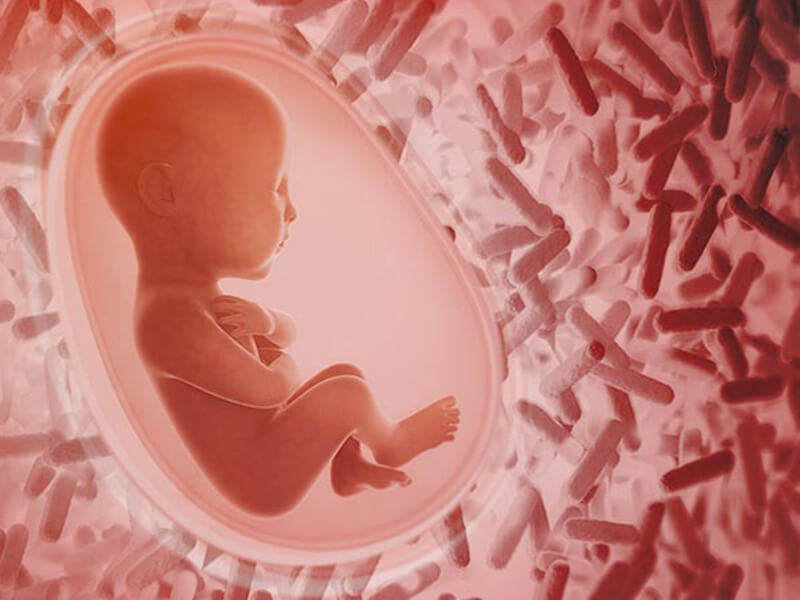Gut microbiota is important for human health also during pregnancy. Let’s discover how gut microorganisms influence this precious time of a woman’s life.
What is gut microbiota?
Our gut hosts billions of microorganisms, in particular bacteria. This community, called the gut microbiota, plays a pivotal role in nutrients assimilation, immune function, and, more in general, wellbeing maintenance. Also known as intestinal flora, gut microbiota is particularly abundant in the colon, where each gram of fecal matter contains 100 billion bacteria.
Gut microbiota composition is unique to each individual. It depends on both intrinsic factors, such as age, and external factors, such as diet. External factors can significantly change gut microbiota balance, playing a role in the development of several diseases. That is why it is important to identify dysbioses (that is, gut microbiota alterations): it allows to act on external factors to correct them.
Gut microbiota in pregnancy
Pregnancy is a time marked by profound changes in a woman’s body. Some (such as immunological ones) are needed to house the baby in the womb; others (metabolic and hormonal) are needed to allows its growth. Endocrinological, metabolic and immunological changes taking place during pregnancy influence also intestinal flora. Some gut microbiota changes are good for mother and child’s health, whereas others could be associated to pregnancy complications or compromise child’s gut microbiota development.
During the first trimester, gut microbiota composition is similar to not-pregnant women one. During the next months, levels of Faecalibacterium (a bacterium with anti-inflammatory activities) and microorganisms diversity decrease, whereas Proteobacteria and Actinobacteria increase. Among these are health-friendly bacteria that plays an important role in defending from pathogens, reinforcing intestinal barrier and nutrient metabolism.
Gut dysbiosis-associated risks during pregnancy
Pregnant women’s gut permeability can increase. This promotes the so-called bacterial translocation, a phenomenon by which microorganism of maternal origin can reach the fetus; in fact, microbes were found in umbilical cord blood, amniotic fluid and meconium too. Moreover, it is supposed that newborn gut is colonized by maternal microbes during delivery.
Maternal gut dysbiosis could promote excessive weight increase during pregnancy, and is associated with greater risk of gestational diabetes. Moreover, in case of maternal dysbiosis the baby could inherit bacterial species associated with pathologies or with undesirable health outcomes, such as diabetes, allergies, or obesity development.
Gut microbiota analysis in pregnancy
For all these reasons during pregnancy is very important to guarantee the mother a good gut microbiota composition and diversity. This is why Bioscience Institute offers to pregnant woman MICROBALANCE, a test to perform the analysis of gut microbiota genome to study gut microbiota composition.
For more informations on the test, visit MICROBALANCE web page or call us at +971 (0)4 375 7220.
References
– Nuriel-Ohayon M et al. Microbial Changes during Pregnancy, Birth, and Infancy. Front Microbiol. 2016 Jul 14;7:1031. doi: 10.3389/fmicb.2016.01031
– Edwards SM et al. The Maternal Gut Microbiome During Pregnancy. MCN Am J Matern Child Nurs. 2017 Nov/Dec; 42(6):310-317.doi: 10.1097/NMC.0000000000000372
– Stout MJ et al. Identification of intracellular bacteria in the basal plate of the human placenta in term and preterm gestations. Am J Obstet Gynecol. 2013 Mar;208(3):226.e1-7. doi: 10.1016/j.ajog.2013.01.018
– Makino H. Bifidobacterial strains in the intestines of newborns originate from their mothers. Biosci Microbiota Food Health. 2018;37(4):79-85. doi: 10.12938/bmfh.18-011.
– Milani C. et al. The First Microbial Colonizers of the Human Gut: Composition, Activities, and Health Implications of the Infant Gut Microbiota. Microbiol Mol Biol Rev. 2017 Nov 8;81(4). pii: e00036-17. doi: 10.1128/MMBR.00036-17

